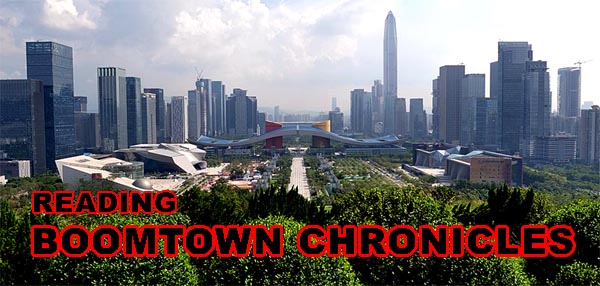 |
| Shenzhen, the Boomtown (Wikipedia) |
Note: Between Lesson #01-128 and #01-207, I wrote 72 lessons explaining expressions in articles published in the Shenzhen Daily. Read more about "Reading Boomtown Chronicles."
Get Ready: Have you ever joined in the mania for some new fad?
Boomtown Chronicles Part VIII - published Monday, August 4, 2008
- Title: "From apathy to mania: the creation of the stock market."
apathy: a lack of interest or concern. An old joke asks, "What's the difference between ignorance and apathy?" and the answer is, "I don't know and I don't care!" The path- in apathy refers to feelings; we find it in other words, like "sympathy" and "pathetic." The a- is what is called the alpha privative, meaning it makes the word a negative. This is found in many words, like atheist (not a theist, or believer in god) and amoral (without morals). So apathy means "no feeling," or a state of unconcern.
mania: a wild amount of feeling, a frenzy, and in its original meaning referred to a kind of madness! So it's very much the opposite of "apathy."
These two words describe the early days when the "Bao'an County United Investment Co." had to deliver individual stocks on bicycles, versus the frenzy that accompanied the issuance of stocks in 1992.
- In the first sentence we read "cradle-to-grave."
cradle-to-grave: a figure of speech in which an object stands for an event (as when a gold watch stands for retirement, or a basket of food represents a picnic). Here, "cradle" is a baby's bed, and represents birth; "grave" of course represents death. So "cradle-to-grave welfare" means that the state cares for the individual from birth to death. (Another, cruder, version is "womb to tomb.")
- Stock prices "surged" and "soared."
surge: a sudden flow, as with water or electricity (my computer is plugged into a "surge protector").
soar: fly high, like birds and airplanes.
- One more phrase: "county seat."
county seat: The administrative center for a county. The main city of a country, state, or province is usually referred to as the "capital." Beijing is the capital of China, and Guangzhou is the capital of Guangdong. But we never say, "the capital of the county"; instead, we say "the county seat." This is only used for counties; we would never call Beijing the "country seat"!
--------
Read more: https://en.wikipedia.org/wiki/Shenzhen
Practice: Choose the correct term to fill in the blank in the sentence below:
- apathy
- county seat
- cradle-to-grave
- mania
- soar
- surge
- Some providers promise ________ healthcare.
- Before we can improve our society, we must overcome the ________ of our citizens.
- Be careful with your bag; there has been a recent ________ in petty crime.
- You may have to go to the ________ to get your birth records.
- It's hard to ________ with the eagles when you're surrounded by turkeys.
- Remember the ________ for fidget spinners? It seemed like everyone was using one!
Answers are in the first comment below.
Submitted to the Shenzhen Daily for August 11, 2008


Answers to the Practice: 1. b; 2. d; 3. a; 4. f; 5. e; 6. c
ReplyDelete